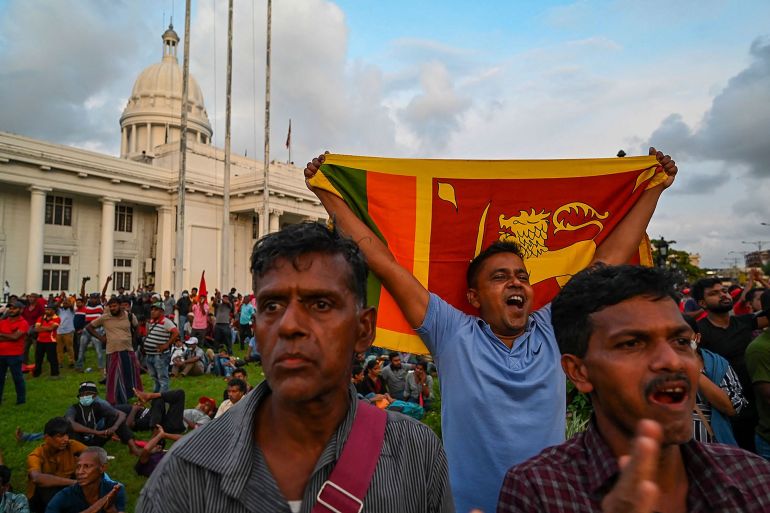IMF says Sri Lanka needs to be on a sustainable debt path
IMF says Sri Lanka’s debt is unsustainable and it needs to restore debt sustainability before it can get any funds.

The International Monetary Fund said discussions with Sri Lanka on a potential IMF loan program are at an early stage and any deal would require “adequate assurances” that the island country’s debts can be put on a sustainable path.
In a statement emailed to the Reuters news agency, IMF Sri Lanka Mission Chief Masahiro Nozaki said that IMF Managing Director Kristalina Georgieva discussed lending options and policy plans with a Sri Lankan delegation on Tuesday.
Keep reading
list of 4 itemsEmbattled Sri Lankan PM offers protesters talks as crisis worsens
Sri Lankans mark new year at protest camp near president’s office
Sri Lanka looks to IMF for an immediate bail out
“An IMF-supported program should be designed to resolve Sri Lanka’s acute balance of payments problems and put the economy back on a sustainable growth path as early as possible,” Nozaki said.
The statement came after protests in response to shortages of fuel and other essentials turned deadly on Tuesday and Sri Lanka’s finance minister formally asked the Fund for a Rapid Financing Instrument (RFI) loan for countries needing urgent balance-of-payments support.
Nozaki said the IMF is “very concerned about the current economic crisis in Sri Lanka and hardships suffered by the people, especially the poor and vulnerable”.
But he noted that IMF staff had determined last month in an annual economic review that Sri Lanka’s public debt was unsustainable, and the country needs to take steps to restore debt sustainability prior to any IMF lending, including the emergency RFI.
Such restoration of debt sustainability typically requires a restructuring or reprofiling of public debts, which in Sri Lanka’s case would require cooperation from China, one of its largest bilateral creditors.
The IMF used the low-conditionality RFI loans extensively to assist countries during the COVID-19 pandemic and has provided such loans to ease balance of payments problems after natural disasters, conflicts and commodity price shocks.
“These considerations would need to be examined for a potential RFI for Sri Lanka, once adequate assurances are obtained that debt sustainability will be resolved,” Nozaki said.
He added that the specific design of a Sri Lanka IMF loan, including program targets and conditionality, would be agreed through extensive discussions between the government and IMF staff.
“The discussions are still at an early stage,” Nozaki said.
The Sri Lankan delegation’s visit follows the central bank’s decision this month to raise interest rates by a record 700 basis points. State-run Ceylon Petroleum Corp on Tuesday increased petrol prices for a second time in April as imports become costlier after authorities ran out of dollars to defend a currency peg and allowed the Sri Lanakan rupee to float free.
Sri Lanka’s stock exchange is closed this week to allow investors to assess the economic conditions.
Newly appointed Power and Energy Minister Kanchana Wijesekera wrote on Twitter Tuesday that the country received new supplies of coal and diesel, implying an easing in the fuel and power crisis.